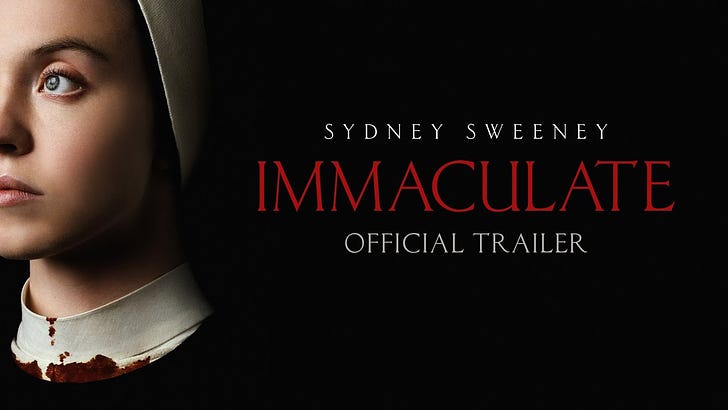Unveiling the Pro-Life Message in 'Immaculate': A Critical Analysis of Faith, Deception, and the Sanctity of Life
Navigating the Intersection of Faith and Politics: A Pro-Life Analysis of 'Immaculate'
In the realm of cinema, few genres captivate audiences as profoundly as horror. Yet, within the chilling narrative of "Immaculate," lies a deeper exploration of themes touching upon faith, bodily autonomy, and the sanctity of life. Directed by Michael Mohan and brought to life by a stellar cast including Sydney Sweeney and Álvaro Morte, "Immaculate" ventures into the depths of psychological terror while subtly weaving a pro-life narrative that challenges societal norms and ethical boundaries.
The Enigmatic Plot:
Set against the backdrop of a picturesque Italian convent, the film unravels the unsettling journey of Sister Cecilia, a devout woman whose faith is tested by the dark secrets veiled within the convent's walls. From the mysterious impregnation of nuns to the harrowing experiments conducted by a former geneticist turned priest, the storyline delves into the manipulation of life itself, raising poignant questions about the value of human existence and the sanctity of motherhood.
The Power of Faith and Deception:
At its core, "Immaculate" serves as a compelling portrayal of the complexities surrounding faith and deception. Sister Cecilia's unwavering devotion to her beliefs is juxtaposed against the sinister machinations of those entrusted with her care. The clandestine activities within the convent serve as a stark reminder of the dangers posed by blind allegiance and the manipulation of religious doctrines for nefarious purposes.
Scriptural Reflections:
Embedded within the narrative fabric of "Immaculate" are subtle references to biblical passages, each underscoring the sanctity of human life and the inherent value bestowed upon every individual. Jeremiah 1:5 reminds us, "Before I formed you in the womb I knew you, before you were born I set you apart."
Jeremiah 1:5 (NIV)
⁵“Before I formed you in the womb I knew you,
before you were born I set you apart;
I appointed you as a prophet to the nations.”
This verse speaks to the divine purpose inherent within each human life, regardless of circumstance or condition. Furthermore, Psalm 139:13-14 declares, "For you created my inmost being; you knit me together in my mother's womb. I praise you because I am fearfully and wonderfully made; your works are wonderful, I know that full well." These verses affirm the intrinsic value of every human life as intricately crafted and beloved by the Creator.
Psalm 139:13-14 (NIV)
¹³For you created my inmost being;
you knit me together in my mother’s womb.
¹⁴I praise you because I am fearfully and wonderfully made;
your works are wonderful,
I know that full well.
A Pro-Life Discourse:
While "Immaculate" has garnered attention for its chilling portrayal of horror, it also offers a compelling pro-life discourse that challenges conventional narratives surrounding abortion and bodily autonomy. The film's exploration of forced pregnancies and unethical experimentation serves as a poignant reminder of the inherent value of every human life, regardless of circumstance or convenience.
Resisting Propaganda:
Amidst the polarizing debates surrounding abortion rights, "Immaculate" stands as a testament to the enduring significance of the pro-life message. Despite attempts to frame the film as a propaganda piece, its underlying themes of faith, morality, and the sanctity of life resonate far beyond the confines of cinematic fiction.
The film's release coincided with a time of heightened political tension, particularly regarding reproductive rights. Sydney Sweeney's appearance on "The View," a prominent talk show known for its liberal-leaning discussions, added fuel to the fire. Critics seized upon this as evidence of the film's supposed alignment with liberal agendas, using it to discredit its underlying pro-life message. However, such attempts at categorization overlook the nuanced portrayal of complex moral dilemmas within the film.
Furthermore, the timing of "Immaculate" in the context of Joe Biden's presidency and the overturning of Roe v. Wade cannot be ignored. President Biden, despite professing to be a devout Catholic like the nun in the movie, has faced criticism for his support of abortion rights. The film's narrative serves as a stark reminder of the moral complexities inherent in such political debates, challenging viewers to confront their own beliefs and biases.
As the specter of Roe v. Wade looms large in the political landscape, "Immaculate" emerges as a lightning rod for discussions surrounding bodily autonomy and the rights of the unborn. Yet, beneath the surface, lies a deeper message—one that transcends partisan divides and speaks to the universal truth of the sanctity of human life.
In the face of prevailing narratives that seek to diminish the value of human life, it is incumbent upon us to resist propaganda and champion a message of hope, compassion, and reverence for all life. "Immaculate" serves as a powerful reminder of the inherent dignity and worth of every individual, born and unborn alike. Through dialogue, empathy, and unwavering advocacy, we can strive to create a world where every life is cherished and protected
The Deceptive Ending:
The climax of "Immaculate," where Sister Cecilia takes matters into her own hands and beats the so-called "experiment" to death with a rock, is a stark departure from the innate compassion and nurturing instinct attributed to mothers. As a pro-life advocate, I firmly believe that mothers faced with difficult pregnancies or infants with deformities seek help and support rather than resorting to violence. This portrayal serves to perpetuate harmful stereotypes and misconceptions about the value of human life.
Rejecting Paranoia and Embracing Hope:
In the wake of the recent overturning of Roe v. Wade and the ongoing political debates surrounding abortion rights, "Immaculate" emerges as a tool of propaganda designed to instill unnecessary paranoia among women regarding the erosion of their bodily autonomy. However, as proponents of the sanctity of life, it is imperative that we reject fear-mongering tactics and instead champion a message of hope and support for women facing difficult pregnancies.
Embracing the Value of Every Life:
It is crucial to emphasize that the value of a human life transcends physical appearance or ability. Despite the challenges posed by deformities or adverse circumstances, every individual possesses inherent worth and potential. Gianna Jessen, a survivor of a saline abortion, exemplifies the resilience and triumph of the human spirit, serving as a testament to the richness and dignity of every life, born and unborn alike.
Conclusion:
As audiences grapple with the haunting imagery and thought-provoking themes of "Immaculate," it becomes evident that the film transcends its genre trappings to offer a profound meditation on the value of human life. In a world fraught with moral ambiguity, it is imperative to heed the underlying message of hope and redemption woven throughout the narrative—a message that reaffirms the inherent dignity and worth of every individual, born and unborn alike. Through discernment and steadfast advocacy, we can continue to uphold the sanctity of life and protect the most vulnerable among us.
If you find value in what I create here and on Instagram, you can support me financially through free-will contributions. You can become a paid subscriber here or PayPal me at http://paypal.me/salocinten
I’ve made this post free for all. The biggest help you could give me is to share it widely (I mean, if you enjoyed it that is..)





